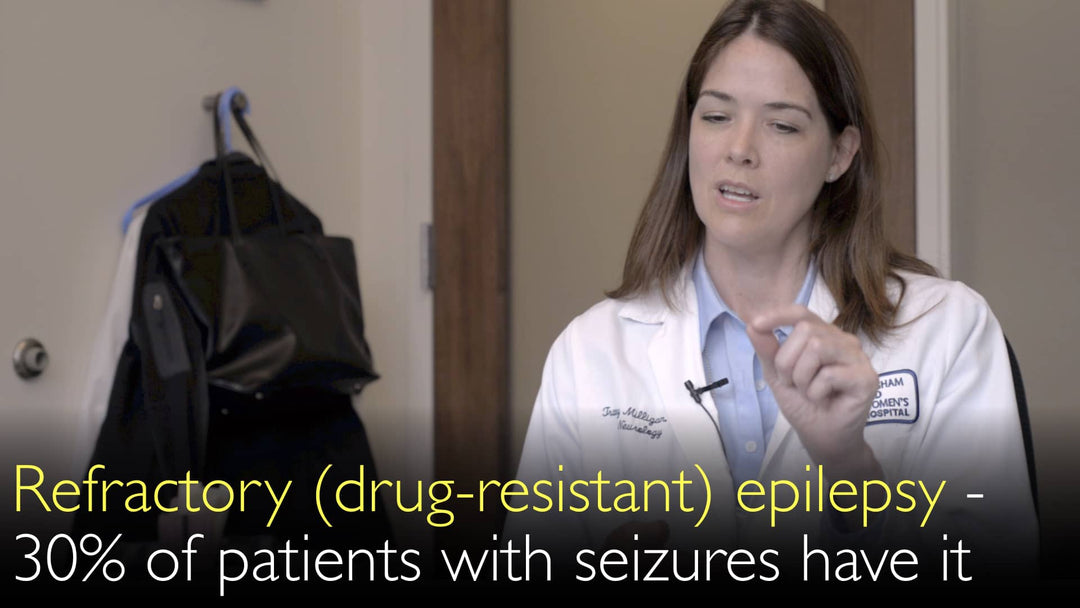Leading expert in advanced epilepsy treatment, Dr. Tracey Milligan, MD, explains refractory epilepsy. She details how 30% of patients have seizures that do not respond to medication. Dr. Tracey Milligan, MD, discusses the diagnostic criteria for drug-resistant epilepsy. She highlights the critical role of advanced brain MRI in identifying a surgical target. Dr. Milligan describes how neurosurgical resection of an epileptic focus can be a curative treatment.
Advanced Treatment Options for Drug-Resistant Epilepsy
Jump To Section
- What is Refractory Epilepsy?
- Diagnosing Drug-Resistant Epilepsy
- The Role of Brain MRI in Evaluation
- Surgical Treatment Options
- Potential for a Surgical Cure
- Full Transcript
What is Refractory Epilepsy?
Refractory epilepsy is a condition where anti-epileptic medications fail to control seizures. Dr. Tracey Milligan, MD, clarifies that these medications are effective for the majority of epilepsy patients. Approximately two-thirds of individuals achieve seizure freedom with proper medication. The remaining one-third of patients continue to experience seizures despite treatment. This specific population is diagnosed with refractory or drug-resistant epilepsy.
Diagnosing Drug-Resistant Epilepsy
A formal diagnosis requires a systematic approach. Dr. Tracey Milligan, MD, explains that a patient must have tried at least two different anti-epileptic medications. Each medication must have been administered at a therapeutic dose. The patient must have taken the medication consistently every day. Only after this best effort fails is a diagnosis of drug-resistant epilepsy confirmed. This careful process ensures patients receive an accurate diagnosis before exploring more advanced options.
The Role of Brain MRI in Evaluation
Advanced imaging is a cornerstone of the workup for refractory epilepsy. Dr. Tracey Milligan, MD, describes the use of a high-resolution brain MRI. The goal is to identify a structural abnormality causing the seizures. Physicians hope to find a visible lesion, such as a benign tumor like a meningioma. Another common finding is a vascular malformation, such as a cavernous angioma. Identifying a clear epileptic focus on an MRI is a positive step. It provides a potential target for a curative surgical intervention.
Surgical Treatment Options
Neurosurgery offers a powerful treatment pathway for suitable candidates. Dr. Tracey Milligan, MD, emphasizes the role of advanced epilepsy centers. These specialized centers evaluate patients whose medications have failed. The primary surgical goal is the complete removal of the epileptic seizure focus. This procedure requires precise pre-operative planning and mapping. The expertise found at a comprehensive epilepsy center is critical for achieving a successful outcome. Dr. Anton Titov, MD, discusses these complex cases with specialists like Dr. Milligan to understand the latest techniques.
Potential for a Surgical Cure
The ultimate goal of epilepsy surgery is a complete cure. Dr. Tracey Milligan, MD, confirms that resection can be a wonderfully effective treatment. When the epileptogenic focus is safely removed, patients may never have another seizure. This outcome represents a life-changing result for individuals with drug-resistant epilepsy. It liberates them from the burden of uncontrolled seizures and daily medication. Dr. Anton Titov, MD, notes that this transformative result is achievable in a significant number of cases. This offers immense hope to patients navigating a diagnosis of refractory epilepsy.
Full Transcript
Dr. Anton Titov, MD: You are a specialist in advanced treatment of epilepsy. What is refractory epilepsy? What are the latest advances in treatment of refractory epilepsy?
Dr. Tracey Milligan, MD: Yes. Refractory epilepsy is when anti-epileptic medications don't work. Anti-epileptic medications work for the vast majority of patients with epilepsy. They are able to control the epileptic seizures. These are two-thirds of patients.
A patient may have epilepsy, and you would never know it because they take an epilepsy medication every day. They do not have epileptic seizures. That leaves one-third of the population with epilepsy.
But in that other one-third of patients with epilepsy, anti-epileptic medications don't work. When anti-epileptic medications don't work, then we call that refractory epilepsy.
We have to try two anti-epileptic medications. We have given our best effort to each epilepsy medication to work. The patient has taken a medication every day. The patient has been able to take a therapeutic dose of medication.
Despite all efforts, if two anti-epileptic medications haven't worked, then it is a refractory epilepsy. Another term for refractory epilepsy would be drug-resistant epilepsy. It means the same thing.
Dr. Anton Titov, MD: What can be done for patients with refractory epilepsy? How to treat refractory epilepsy successfully?
Dr. Tracey Milligan, MD: A patient may have a drug-resistant epilepsy. We then hope that the epilepsy is due to a specific lesion in the brain. It is a little bit ironic because when anti-epileptic medications don't work in a patient, we perform a brain MRI.
We hope that their brain MRI is abnormal. We hope that a picture of the brain on MRI will show us maybe a little tumor. We hope it is a benign tumor like a meningioma.
Or we hope to see a little vascular malformation, like a cavernous angioma malformation. There is something that we can see on the MRI. That is a likely source of the epileptic seizures.
Neurosurgical operation could be curative in such situation if the epilepsy-generating focus can be safely removed with surgery. They may never have another epileptic seizure again. Those are wonderful things.
We may be able to help patients at an advanced epilepsy center like the one we have here. We can help patients when anti-epileptic medications do not work at all.
We can use a neurosurgical technique to remove the epileptic seizure focus. This will hopefully allow patients to be epileptic seizure-free. It can perhaps cure patients of epilepsy.
Dr. Anton Titov, MD: That would be a wonderful result certainly! It happens in many cases.




